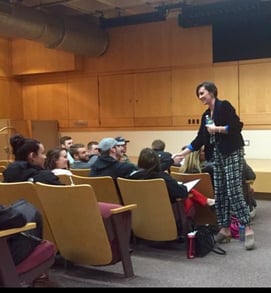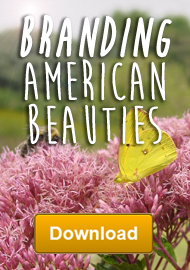I gave this to talk an energetic and really smart group of PRSSA members at West Chester University. I had a great time and they asked a lot of great questions. It was an honor to share these tips with them in the hopes that they nail their next interview! I wanted to share my talk with you as well:

Sure, interviews can be stressful. You are subject to examination under a microscope, and you've got a small chunk of time to convince someone why hiring you would be a fantastic business decision.
With a little forethought, a bit of practice and the right attitude, you can walk away from that office expecting a good news phone call in the near future.
Continue reading to learn how to ace any interview.
Part 1: Getting the Interview
Tighten up that resume. Present the facts in a professional and creative way. No typos. Format it beautifully. Don’t be afraid to tailor the resume specifically for the job. Garden Media is a PR firm that specializes in gardening. Did you work at a garden center or florist in high school? It might not be relevant for another job but at our firm- you better believe it! Spring for thick resume paper.
Cover it all. Your cover letter should be the body of your email. NOT an attachment. I shouldn’t have to click too many times to find out who you are.
Be specific. Don’t say sir/madam. Address a real person and say why you should be chosen for this job specifically.
Part 2: The Interview
Bring Handouts. Your resume. Writing samples. Examples of your work that relates to the job. Portfolio. Bring anything that shows you are prepared and you are qualified.
Look and act like a pro. Make sure every detail of your appearance is flawless. Smile a lot. Make eye contact. And most importantly, have a firm handshake.
Do Your Homework. Find out as much as you can about the company and the people who run it. The goal is to be able to speak about the company as if you're an expert (even if you just Googled them yesterday) or already an employee, which demonstrates you are already invested in the job.
Rehearse Your Responses. (But Don't Make Them Sound That Way) Take thoughtful pauses to allow your interviewer to digest and respond to your thoughts.
- What is your greatest weakness?
- Talk about a time when you resolved a conflict on the job.
- How do you handle stress?
- Why are you the best person for the job?
Make Strategic Small Talk. You’re both human and may, in fact, work together. So try to connect on a personal level. If it feels natural, use small talk as a bridge. Maybe your interviewer has a kid who plays hockey -- which is funny, because you played left wing in college, which really helped you learn the value of teamwork.
Interview Your Interviewer. The interview process is a time for both a company and candidate to feel the other out and see if it is a good fit. So make sure to ask questions. This shows your interviewer you are thinking about your role and their growth. When you ask questions about expectations, job mobility and job environment, it shows that you value yourself and your time, and that you're looking for a mutually beneficial partnership.
- What are some upcoming corporate goals?
- How about job growth and future opportunities?
Exude Confidence and Congeniality. Confidence is the ultimate companion of success, and congeniality is a surefire way to leave a lasting impression. Employers want to hire people who can positively influence others, who are confident in their skills and abilities and who are just generally pleasant to be around.
Part 3: After the Interview
Thank them. Send a thank-you email to your interviewer and everyone you talked to the same day you visited the office. E-mail addresses can usually be found on their website. Include any materials discussed in the interview.
Thank them again. Send a hand written thank–you note immediately. One will do to the highest position of person you interviewed with unless they were all high-up’s.
Use connections. Know someone who knows someone? The right connections can help you get you the job over someone else. A personal reference goes such a long way. If they didn’t ask for references, offer them. If the connection is solid, ask them to put in a good word for you.
Be the squeaky wheel. Do you know the expression the squeaky wheel gets the oil? It’s true. Follow up.
Remember, they are as positive and hopeful about finding a new member of their team as you are about landing the perfect job. So don’t be nervous! Just be yourself.















